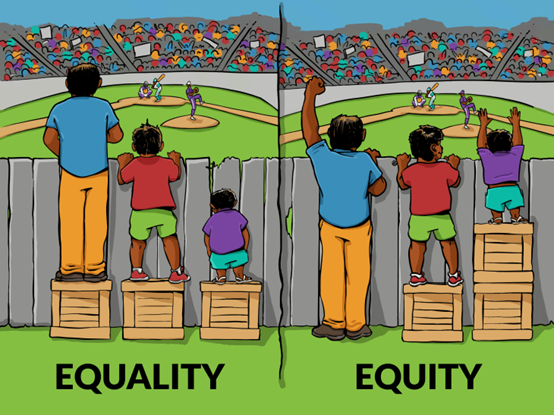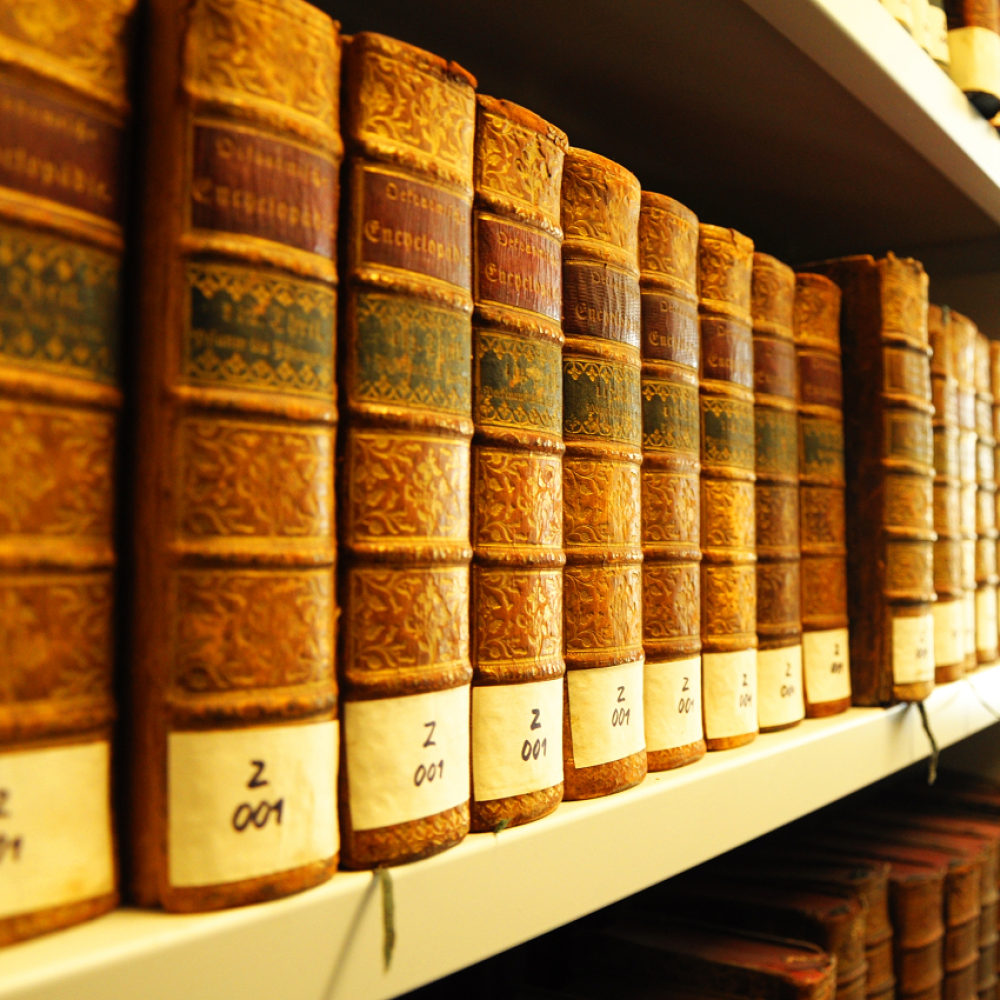
Equity
Equity encompasses fairness, justice, and respect. In community-police relations, equity is recognizing that individuals and communities have unique characteristics and needs, and ensuring that everyone, regardless of background or status, receives fair treatment and the tailored support or assistance they need from the police.
Why is Equity Important?
Equity in policing can play a vital role in building community trust and improving public safety. By prioritizing equitable treatment, individual police officers and entire departments can foster the development of a collaborative, trusting environment where community members feel valued and empowered. Research suggests that addressing community needs as they arise and ensuring equitable access to resources can support trust-building, reduce disparities, and improve overall community health.[1] When everyone has what they need to be successful, communities become healthier, happier, and stronger.
[1]Amy E. Lansing, et al., “Building Trust: Leadership Reflections on Community Empowerment and Engagement in a Large Urban Initiative,” BMC Public Health 23, no. 1252 (2023): 2. https://doi.org/10.1186/s12889-023-15860-z.
Equity vs. Equality
Equality means treating everyone the same, regardless of race, gender, age, disability, or other characteristics. Equity, on the other hand, recognizes that each person has a unique background, skills, abilities, preferences, and needs.
Efforts to increase equity focus on treating individuals and communities in a way that recognizes and responds to their unique needs. The following quote illustrates the difference between equality and equity: “Equality is giving everyone a shoe, equity is giving everyone a shoe that fits.”[1]
Understanding a community’s context and background is key to developing and implementing fair and responsive policies and practices. Many communities face challenges and disparities that significantly impact the lives of community members, such as past or current experiences of discrimination based on race, gender identity, difficulties accessing quality health care and education, gainful employment, safe housing, or other life necessities. Recognizing and responding to the community’s unique characteristics, strengths, and preferences will help police agencies build community trust and engage community members in improving public safety.
[1] Martha Minow, “Equality vs. Equity,” American Journal of Law and Equality 1, (2021): 174, https://doi.org/10.1162/ajle_a_00019.
The image below, created by the Interactional Institute for Social Change, provides a visual depiction of the differences between equity and equality.

Definitions
Bias
Bias refers to attitudes or stereotypes individuals hold about groups of people (e.g., based on race, gender, age, disability), which can affect one’s understanding, actions, and decisions. In many cases, biases are implicit—which means individuals are not aware that they have these attitudes or how they affect the way they interact with others. Perceiving or experiencing biased treatment can erode community members’ trust in the police, making them less likely to cooperate or engage in a positive way with law enforcement.
Discrimination
Discrimination means treating others differently because they are members of a particular group (e.g., based on race, gender, or disability), thereby causing disadvantages or denial of rights and opportunities.[1] Discriminatory practices erode trust and escalate tensions between the police and the community. Challenging discrimination is key to ensuring that everyone in the community feels safe and respected.
Diversity
Diversity is concerned with ensuring the representation and engagement of people who have different sociodemographic characteristics, backgrounds, and experiences. Incorporating a diversity of perspectives helps police agencies build trust and understanding with the communities they serve. Recognizing and respecting the diverse identities, cultures, and belief systems present in the community can help foster improved relationships and cooperation.
Equity
Equity means ensuring that everyone is provided with the resources they need so they have the equal opportunity to thrive. In police-community relations, equity speaks to fair treatment for everyone, regardless of background or status, and requires a tailored response from police to address the specific needs and challenges of the individual, specific population, or wider community.
Historical trauma
Historical trauma refers to cumulative emotional or psychological trauma passed down through generations due to collective experiences of oppression.[2] Communities with a history of traumatic interactions with police can develop mistrust, resistance, and fear. Understanding the ongoing effects of historical trauma can help police agencies work towards repairing and building community trust.
Inclusion
Inclusion involves engaging diverse community members in a way that makes them feel respected, valued, and supported.
Institutional and structural racism
Institutional racism refers to the unfair treatment of people of certain races that is built into the policies and practices of an organization. Structural racism is when this unfair treatment is part of society's systems and structures, such as within the education, health, and criminal justice systems. In police-community relations, recognizing, acknowledging, and challenging these forms of racism are crucial for building trust and fairness.
Justice
Justice means ensuring that everyone is treated fairly, according to the law. It involves righting wrongs, implementing corrective actions, and ensuring that rules are fair for everyone. Treating all community members fairly and justly will help police build trust with the community. Fair treatment ensures that citizens know that their rights are protected and that they can rely on the police to act impartially.
Procedural Justice
Procedural justice refers to the idea that the methods and processes by which decisions are made should be fair and transparent. In policing, this means that the procedures followed by police officers in their interactions with the community should be consistent, unbiased, and involve the community in a way that respects their dignity and rights.
Equity aligns with procedural justice by ensuring that the police adapt their practices to address the specific needs and contexts of different communities. For instance, understanding and addressing the unique challenges faced by marginalized groups is a way to ensure that policing is fair and just. By incorporating equity into procedural justice, police can work towards ensuring that their actions do not disproportionately disadvantage certain groups, thus supporting fairness in outcomes.
Procedural justice supports equality by enforcing consistent standards and practices across all interactions. This means that regardless of who you are or where you come from, the process should be the same, ensuring that everyone is treated equally under the law.
Equality focuses on providing the same treatment for all, but procedural justice ensures that the processes leading to that treatment are fair. This means that even if the treatment is the same, the process of reaching that treatment should be transparent and unbiased.
When communities perceive that the police are fair and just in their procedures, they are more likely to cooperate and engage positively with police thereby increasing trust.
Oppression
Oppression is the systemic and institutionalized mistreatment of a societal group, often maintained through laws, policies, culture, and social practices.[3] Experiencing oppression can lead to feelings of alienation and suspicion, which can lead to separation and “othering” from other groups and systems. Othering is the oppositive of “we”: it means focusing on differences with people and using those differences to prevent a sense of similarity or connectedness between people. It is essential to community trust that police agencies work against oppression to ensure that all community members are treated justly and fairly and are allowed to maintain their dignity.
[1] International Association of Chiefs of Police (IACP), Harassment and Discrimination, (Alexandria, VA, 2018), 2.
[2] Maria Yellow Horse Brave Heart, “The Return to the Sacred Path: Healing the Historical Trauma and Historical Unresolved Grief Response among the Lakota through a Psychoeducational Group Intervention,” Smith College Studies in Social Work 68, no.3 (June 1998): 287–305, https://doi.org/10.1080/00377319809517532.
[3]Johan Galtung, “Violence, Peace, and Peace Research,” Journal of Peace Research 6, no. 3 (1969): 167–91, https://doi.org/10.1177/002234336900600301.


